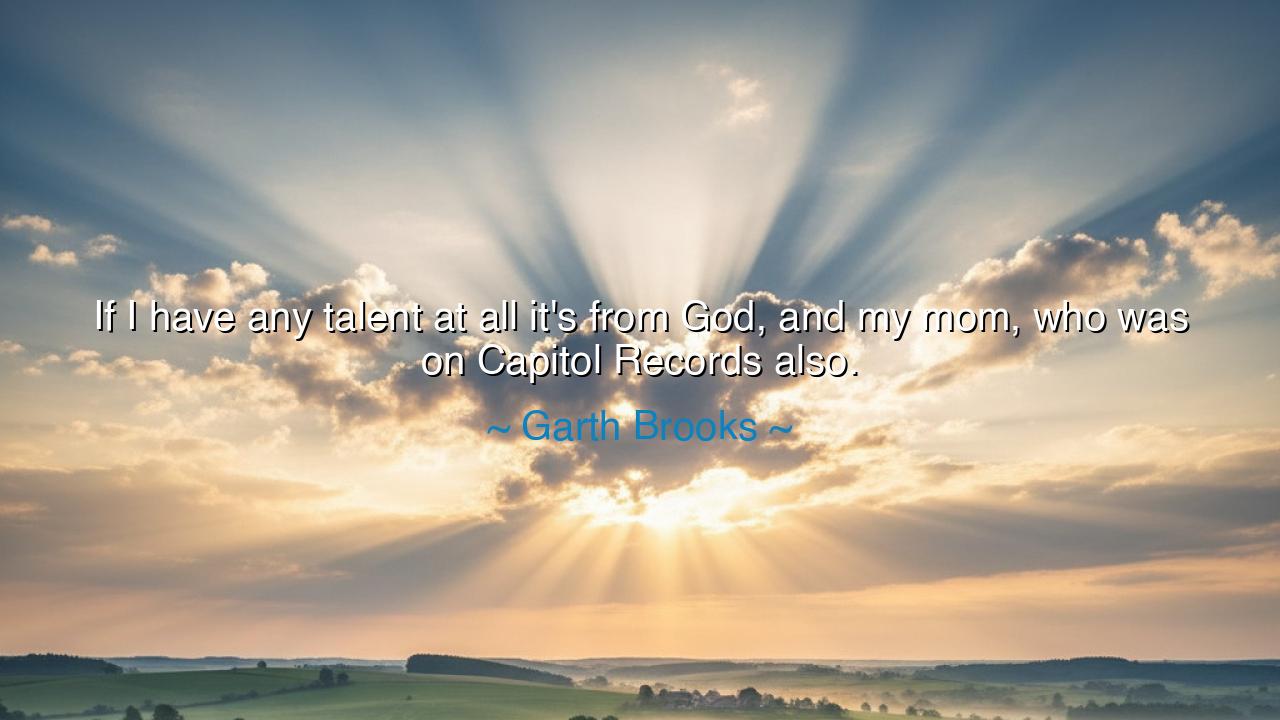
If I have any talent at all it's from God, and my mom, who was on
If I have any talent at all it's from God, and my mom, who was on Capitol Records also.






Hearken, children of wisdom, to the words of Garth Brooks, who humbly declares: "If I have any talent at all it's from God, and my mom, who was on Capitol Records also." In this simple proclamation lies a profound meditation on the origins of human gift and the humility required to recognize it. Here, talent is not seen as mere self-invention, but as a blessing, a confluence of divine grace and ancestral inheritance—a sacred thread woven through lineage and nurtured by the hearts of those who came before.
Since time immemorial, the ancients understood that the gifts of the soul are rarely solitary. The poet Pindar wrote of talent as a gift bestowed by the gods, to be cultivated with reverence, discipline, and gratitude. Brooks’s acknowledgment of God as the source of his ability echoes this truth, reminding us that every melody, every expression of artistry, is first a blessing, and that human effort is but the vessel through which divine spark manifests.
Yet Garth Brooks does not stop at divinity alone; he turns his gaze to the maternal hand, recognizing that his mother’s life, her own journey in music upon Capitol Records, seeded within him both aptitude and inspiration. This speaks to a timeless principle: the wisdom, labor, and example of parents shape the contours of our abilities. The legacy of those who nurture us becomes part of our soul’s architecture, the foundation upon which talents are built and the courage to express them is sustained.
Consider the life of Wolfgang Amadeus Mozart, whose genius dazzled Europe. Though his compositions were heralded as divine inspiration, the role of his father Leopold, a masterful musician and teacher, was central. Leopold’s guidance, discipline, and recognition of Wolfgang’s innate gift nurtured the talent that the gods themselves seemed to bless. Just as Brooks honors his mother, history teaches us that talent is seldom isolated, emerging instead from the sacred interplay of heritage, environment, and grace.
The quote also reminds us of the virtue of humility. To acknowledge that one’s abilities are not entirely self-made is to cultivate gratitude, perspective, and responsibility. The ancients prized such awareness, for hubris often precedes downfall. By attributing his gifts to God and his mother, Brooks elevates the act of giving thanks to the eternal, demonstrating that the recognition of origin—divine or familial—is a mark of wisdom and character.
This insight carries a practical lesson for all: nurture the gifts within you, but never lose sight of their sources. Honor your mentors, your parents, your teachers, and the unseen forces that have shaped your path. Recognize that every skill, every accomplishment, is both inherited and cultivated, a mosaic of effort, environment, and blessing. To do so is to live in harmony with the eternal principles of gratitude and stewardship.
Let this truth guide action: dedicate yourself to practice and refinement of your abilities, but do so with acknowledgment of those who laid the groundwork. Share your talents generously, as a tribute to both the divine and the human guidance that brought them forth. Encourage those who follow you, fostering a lineage of creativity and reverence, as your own parents once did. Through this, the cycle of talent, gratitude, and inspiration endures.
Remember, children of the ages, that the gifts we possess are not solely our own. The voice of Garth Brooks calls us to see the sacred confluence of God, family, and effort that shapes every talent. To honor that source is to honor life itself, to walk with humility, and to express our abilities not as vanity, but as gratitude made manifest. In this understanding lies the path to true greatness—rooted not in ego, but in reverent acknowledgment of all that has been given to us.






AAdministratorAdministrator
Welcome, honored guests. Please leave a comment, we will respond soon